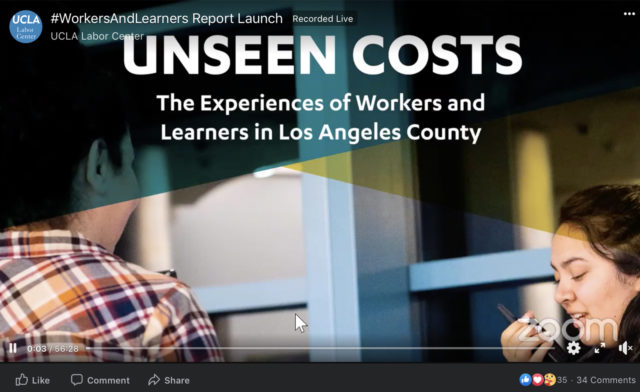The coronavirus pandemic has exacerbated the difficulties students with jobs face, a UCLA report found.
The UCLA Labor Center and the Dolores Huerta Labor Institute released a report and supplemental brief June 23, which looked at the challenges faced by working students at public colleges and universities in Los Angeles County and how these students have been affected by COVID-19.
The researchers collected data from more than 800 surveys and almost 80 interviews with working students, according to the report.
More than half of the 725,000 undergraduate students in LA County work, said Janna Shadduck-Hernández, a project director at the UCLA Labor Center, at a press briefing June 23.
Around 78% of students who work also take at least 12 units of coursework and 35% work 30 hours or more a week, the report found.
Additionally, 23% of students work more than one job, many while completing additional majors or minors, said Mindy Chen, a co-author of the report and faculty co-director of the Dolores Huerta Labor Institute at the LA Community College District.
Researchers found that these students are often penalized through missed academic opportunities, such as leaving class early or arriving late, missing class completely or turning in assignments late, added Chen, who is also a labor studies professor at LA Trade Technical College.
The report found that 40% of students considered withdrawing or taking a break from school prior to the coronavirus pandemic, Chen said.
Iris López, a researcher on the project and a recent UCLA alumna, said while many students are concerned about financing their education, they face additional concerns about food insecurity.
Despite access to financial aid and work, over half of all working students have experienced at least one type of food insecurity and one-third of these students have faced at least one form of housing insecurity, said Michele Wong, a graduate student researcher at the UCLA Labor Center.
“Education should not cost us our ability to eat or cause concern over how we’re going to be able to pay for our next few units,” López said. “I feel like this country needs to do better by its people.”
Sophia Ángeles, a graduate student researcher at the UCLA Labor Center, said COVID-19 has exacerbated these already present inequalities.
The sudden shift to remote learning impacted working students’ educational experiences, with 59% reporting that course materials were difficult to understand during the pandemic, Ángeles said. Some students said they had to teach themselves material after live instruction was replaced with noninteractive forms of learning, according to the report.
Crystal Hammond, a student at Santa Monica Community College, Los Angeles City College and LA Trade Technical College, said she works three different internships that require in-person collaboration and panicked when she first learned about the coronavirus pandemic because she was uncertain how she would receive financial support.
She fell behind in her classes after the pandemic hit because she had to call agencies for relief funding, she added.
“Social distancing, although for a preventative measure, has put me at a disadvantage as an individual coming from a low-income background,” Hammond said.
Additionally, half of all working students were laid off, terminated or furloughed after the pandemic began, Ángeles said. Among students who were able to continue working, half saw their hours decrease and about 70% were concerned about their safety at work, she added.
Many working students also faced difficulties paying for rent and had to take on extra household duties or financial responsibilities, Ángeles said.
Prior to the pandemic, Sierra Hudson, an undergraduate researcher on the project and a recent UCLA alumna, had to work extra hours babysitting and tutoring even though she had access to financial aid, work study and student loans.
However, because of COVID-19, she was no longer able to earn the extra income and had to decide between paying for rent or paying for food.
“I went from a studious straight-A student (to) one who missed assignments and sometimes class,” she said. “I was feeling very hopeless and at one point in the quarter, I almost dropped out.”
Déjà Thomas, a graduate researcher who worked on the report, said both employers and schools need to take into account and accommodate the dual identity of workers and learners.
Thomas added that the researchers also recommend making college more affordable to help students more easily manage their finances and offering work-study year-round to all students.
“They need to be really deeply empowered to be able to not only manage the finances and costs, but really understand all the decisions that they’re making,” she said.

